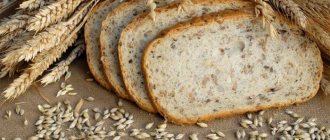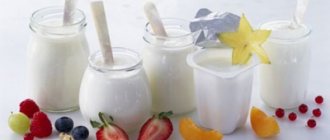Special recipe
For the preparation of yoghurts, special starter cultures are used, containing two strains: lactic acid streptococcus and Bulgarian bacillus. This combination is very effective. The strains have high enzymatic activity and ferment the product. In addition, yoghurts contain beneficial bacteria - probiotics. They are able to have a positive effect on the intestinal microflora, helping “good” bacteria to grow and suppressing the growth of “bad” ones. Compared to milk, yogurt contains slightly less milk sugar - lactose, which may be suitable for children with reduced lactase activity (but not lactose intolerance)!
What you need to know about yogurt
It was yogurt that received the exclusive title of the healthiest dairy product [3]. Advertising, parents, the Internet, pseudo-nutritionists tell us that this is the healthiest dessert that improves digestion, removes local fat deposits, saturates the body with useful vitamins/nutrients, makes hair beautiful, teeth healthy, and life much brighter [4].
Content:
- What you need to know about yogurt
- Do all yoghurts carry hidden dangers?
- How and from what to make healthy yogurt
- Is yogurt a dietary food?
- The connection between yogurt and probiotics
According to statistics, 1 person eats about 40 kilograms of this dairy product per year. Every consumer imagines himself to be absolutely healthy and literate (from the point of view of rational food consumption), but, unfortunately, he is very mistaken.
If we exclude the harm from the milk itself, then yogurt is a concentrated mixture stuffed with chemicals, flavorings, handfuls of sugar and flavor enhancers [5]. Even small children in kindergartens understand that you can endlessly look for fruit in “fruit yogurt.” Instead, fragrances, food colorings and other identical natural substitutes are placed in jars. Artificial essences excite our taste buds much more than ripe kiwis or rich raspberries. So-called “natural” fruits, even if they are actually included, go through a long process of processing, which completely kills the beneficial properties, depriving the product of both taste and smell.
1 serving of yogurt contains about 20 grams of lactose (natural sugar) and 15 grams of artificial sweeteners [6]. As a result, the product acquires a high glycemic index, provokes sharp jumps in blood glucose, increases the risk of obesity, and the occurrence of heart and vascular pathologies.
The author of the book “The China Study,” Dr. Colleen Campbell, has proven a direct link between the consumption of cow’s milk-based yoghurts and the development of cancer.
Milk, as the main component, transfers a certain list of properties to derivative products. These properties can be both positive and negative. Milk contains the hormone insulin-like growth factor (IGF-I), which affects cancer. The hormone stimulates the rapid growth and spread of cancer cells, which leads to lightning-fast infection and deterioration in human health.
Those who struggle with acne or are very sensitive to allergens should also exclude yoghurt from their diet. Scientists have proven that eating dairy products and having a clean face are completely incompatible concepts. The skin, as the largest organ, does its best to hint to a person that harm not only settles inside, but also comes out. Observe your own body’s reaction: if after a few spoons of yogurt you suffer from acne, irritation, redness or subcutaneous pimples, exclude the product from your diet. Clean skin and a healthy body are much more important than temporary food pleasures.
Probiotics and prebiotics: improve digestion, support immunity
Today there is a new direction in improving the biological properties of yoghurts - enriching the product with pro- and prebiotics. Probiotics are live microorganisms that have strict requirements. They must be safe and have a positive effect on the intestinal microflora and the human body as a whole. Probiotics include individual strains of lacto- and bifidobacteria.
Some yoghurts use Bifidobacterium lactis-BB-12 as a probiotic strain, which is currently the most studied beneficial bacterium in the world. BB-12 attaches well to the mucous membrane of the small intestine and, thanks to this, can remain there for a long time. It also has a positive effect on digestive processes and the immune response. This bacterium has an important feature: it can tolerate the acidic environment of the stomach, as well as bile acids, better than other strains and does not lose its viability and activity during storage.
Prebiotics are food components that are indigestible by gastrointestinal enzymes - oligo- and polysaccharides. They are “eaten” by beneficial intestinal microorganisms during their growth and thereby improve the composition of the local microflora. Some yoghurts contain oligofructose as prebiotics. Fermented milk products enriched with pro- and prebiotics are beneficial for digestion and intestinal microflora, which, in turn, is the first step to maintaining immunity.
How and from what to make healthy yogurt
Lactose intolerance is not a scourge of the modern generation, but a completely common property of the human body [9]. After 5 years, we stop absorbing lactose, and its uninterrupted intake into the body provokes stool disorders, abdominal pain, chronic pathologies and acne. To avoid these symptoms and feel completely healthy, replace cow's milk with coconut milk. It is much healthier, more natural and nutritious.
You can use cream instead of coconut milk. If coconut milk doesn't suit your taste or budget, then consider almond, hemp, soy, rice, hazelnut, oat and goat milk. For example, goat milk yogurts contain about 8 grams of protein and 30% of your daily calcium (Ca) requirement. This product is perfect as one of the components of breakfast or a snack to stay in good shape throughout the day.
Raw Coconut Yogurt Recipe (1)
We will need:
- coconut milk - 1 can;
- probiotic capsule – 1 pc. (use as desired, can be omitted from the recipe).
Preparation
Leave the can of coconut milk in the refrigerator overnight. In the morning, you will see that a white dense layer has separated from the transparent coconut liquid, which looks like hardened cream. Remove this cream with a spoon and place in a convenient container. You can simply drink coconut water or use it in other recipes. The resulting cream is natural and healthy yogurt. You can add probiotics, fruits and other healthy ingredients to your liking. Mix the mixture well and start eating. The delicate coconut taste and aroma will not leave anyone indifferent. Given the natural sweetness of coconut, there is no need to add sweeteners or flavor enhancers to yogurt, which is a significant advantage over store-bought cow's milk yogurts.
Raw Coconut Yogurt Recipe (2)
We will need:
- coconut milk - 1 can;
- agar-agar – 1 teaspoon;
- probiotic capsule – 1 pc (used as desired, can be excluded from the recipe).
Preparation
Pour a whole can of coconut milk into a deep saucepan, then add agar agar. Do not stir the mixture, otherwise you will not get the desired yogurt consistency. Place the pan over medium heat and wait until it comes to a boil. As soon as you see that the milk is boiling and the crumbly agar-agar is melting, carefully stir the contents of the pan and reduce the heat to the lowest possible setting. Stir the mixture constantly for 5 minutes. Then remove the pan from the stove and let cool at room temperature.
Once the milk is cold, add probiotics (optional), fruits, seeds and other ingredients. Pour the contents into a jar and place in the refrigerator. After some time, the milk will begin to harden and the structure will become similar to soft jelly. Place coconut jelly in a blender, beat until smooth, taste and add the missing ingredients.
Coconut milk-based yogurt should be stored in the refrigerator for no more than 14 days.
Prebiotics in products are an important component of comprehensive prevention of dysbiosis
In order for living beneficial bacteria to actively multiply and perform their function, they need food substrates - prebiotics. Every day we consume a moderate amount of plant food, which our digestive system is not able to ferment, but little helpers - intestinal bacteria - cope well with this, and in return they synthesize important metabolites for the body, participate in modulating the immune system and protect us from infections.
Prebiotics in food:
- Apples;
- Strawberry;
- Bananas;
- Barley;
- Onion;
- Garlic;
- Chicory;
- Jerusalem artichoke;
- Seaweed.
To achieve effective prevention of dysbiosis, it is necessary to select food probiotics and prebiotics, since different bacteria require different substrates for fermentation.
Our company produces combined multiprobiotics with unique healing properties, combining a multi-species symbiosis of probiotic bacteria, highly purified smectite gel (a natural mineral with a wide range of beneficial properties) and other products of natural origin (wheat germ meal, omega-3 fatty acids, propolis extract ).
- Simbiter® forte-D;
- Simbiter® forte-M;
- Simbiter® forte cereal;
- Simbiter® forte omega;
- Simbiter® forte with propolis.
As well as enterosorbents Simbiogel® and fermented milk products Simbivit®. In the product profile you can find all the necessary information about dietary supplements from our company.
We also recommend that you familiarize yourself with the three-stage microbiome restoration program developed by O.D. Prolisok" based on many years of clinical research and the results of the use of probiotic therapy in practical medicine.
Can probiotic products replace a multiprobiotic?
Probiotics and prebiotics in products are an essential component of the comprehensive prevention and treatment of dysbiosis in children and adults. However, in most cases, limiting yourself to diet alone will not work.
To fully restore the microflora, we recommend the dietary supplements Simbiter® and Apibact®. These multiprobiotics contain billions of beneficial bacteria adapted to the body's needs during health crises, for example:
- Newborn;
- Pregnancy and postpartum period;
- Viral and bacterial diseases accompanied by intoxication and diarrhea;
- Taking antibiotics;
- Congenital and acquired diseases of the gastrointestinal tract;
- Temporary or persistent decrease in immunity.
Simbiter® and Apibact® help effectively prevent and eliminate the symptoms of dysbiosis and its complications. If you have any questions about probiotic therapy, you can ask a specialist at O.D. Prolisok" by phone or at the company's office in Kyiv.
We provide targeted delivery of drugs throughout Kyiv and the Kyiv region in the shortest possible time; to purchase products in other regions of Ukraine, please contact a sales point convenient for you.
Which drinking yogurt, bio-yogurt is the healthiest: names, brands, list
It is worth dispelling the myth that lactobacilli somehow depend on the thickness of yogurt. Regardless of the consistency, be it thick or liquid, the bacteria in its composition will be in the same quantity.
- " BIO balance" . Although this is not the highest score in terms of results (64), in terms of characteristics it can be called the best (compared to other manufacturers). This yogurt contains not only milk fats and the required amount of lactic acid bacteria, but also bifidoactive bacteria. The latter component maintains normal acidity in the intestines and also eliminates problems such as diarrhea or constipation. Moreover, prevention of the development of cancer microorganisms in the intestines and colon was noted. This product has the highest levels of naturalness and safety.
- But the taste is a little unusual, as for a fermented milk product. The comments also concern the smell. Moreover, there is a ratio of glucose and fructose at an inappropriate position.
Drinking yogurt
- But the naturalness is a little lame - the taste depends on the use of taste stabilizers, flavors and dyes.
- But these bifidobacteria are significantly lower than the values that should be according to the regulations.
- The smell does not correspond to the specified filler, the taste is also inappropriate for this product - sweet and sour.
- But milk proteins “fell” below the established standards. And there is a certain mealiness in the taste, which is not typical for a fermented milk product and indicates the content of modified starch.
- Very important - the rate of foreign bacteria is approximately 800 times higher. Specifically, yeast. This indicates non-compliance with many processing rules. And do not forget that such an omission can attract other dangerous microorganisms, for example, staphylococcus bacteria or E. coli.
Has a significant excess of foreign bacteria











